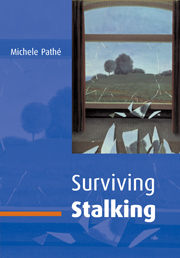Book contents
- Frontmatter
- Contents
- Acknowledgments
- Introduction
- 1 What is stalking?
- 2 How common is stalking?
- 3 Who stalks?
- 4 Could I be assaulted?
- 5 Can stalkers be treated?
- 6 Who are the victims of stalking?
- 7 The impact of stalking
- 8 Reducing your chances of victimization
- 9 Evading the stalker
- 10 Navigating the criminal justice system in the United States of America
- 11 Navigating the criminal justice system in the United Kingdom
- 12 Navigating the criminal justice system in Australia
- 13 Should I just disappear?
- 14 How do I deal with the emotional impact of stalking?
- 15 How you can assist victims of stalking
- Conclusions
- References
- Reading guide
- Appendix 1 Other resources
- Appendix 2 Protection from Harassment Act 1997
- Appendix 3 Sample restraining order under Protection from Harassment Act 1997
- Appendix 4 Criminal justice system flow chart, UK
- Index
Introduction
Published online by Cambridge University Press: 04 September 2009
- Frontmatter
- Contents
- Acknowledgments
- Introduction
- 1 What is stalking?
- 2 How common is stalking?
- 3 Who stalks?
- 4 Could I be assaulted?
- 5 Can stalkers be treated?
- 6 Who are the victims of stalking?
- 7 The impact of stalking
- 8 Reducing your chances of victimization
- 9 Evading the stalker
- 10 Navigating the criminal justice system in the United States of America
- 11 Navigating the criminal justice system in the United Kingdom
- 12 Navigating the criminal justice system in Australia
- 13 Should I just disappear?
- 14 How do I deal with the emotional impact of stalking?
- 15 How you can assist victims of stalking
- Conclusions
- References
- Reading guide
- Appendix 1 Other resources
- Appendix 2 Protection from Harassment Act 1997
- Appendix 3 Sample restraining order under Protection from Harassment Act 1997
- Appendix 4 Criminal justice system flow chart, UK
- Index
Summary
In the space of a decade, the word ‘stalking’ has acquired a new meaning and significance in our vocabulary. Most people are acquainted with its contemporary use, either through various depictions in the media or through personal knowledge of someone exposed to the unwanted attentions of a stalker. The term ‘stalking’ has been used since ancient times to refer both to the act of following one's prey and to walk stealthily, but it was only in the late 1980s that the media coined the word to describe the persistent pestering and harassment of celebrities by fans. Use of the term has been progressively expanded to encompass the behaviours of those who harass previous partners, fellow workers, acquaintances and a range of other ordinary people. The behaviour itself is not new, but labelling it and acknowledging it as an important social problem has enabled us to recognize and act upon it.
Our understanding of stalking is still evolving. There is not much published work on the subject, and much of it offers little in the way of practical solutions to the problem. Research is gathering momentum, however, generating some insights into the nature of stalking, its frequency, and the characteristics and motives of those who stalk and the people they target.
- Type
- Chapter
- Information
- Surviving Stalking , pp. 1 - 6Publisher: Cambridge University PressPrint publication year: 2002



